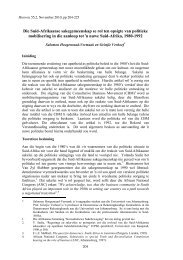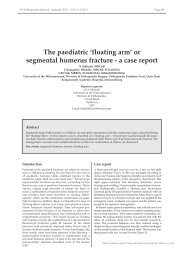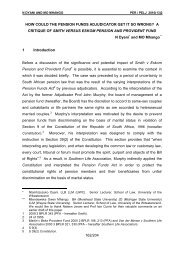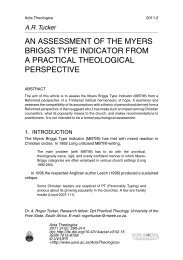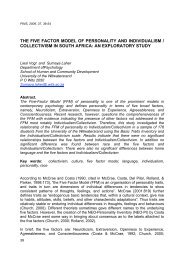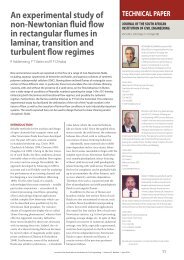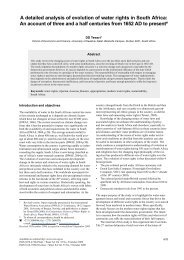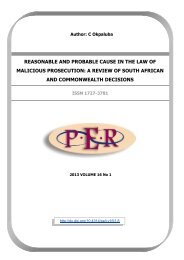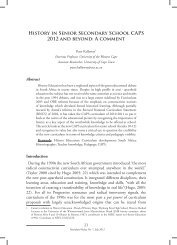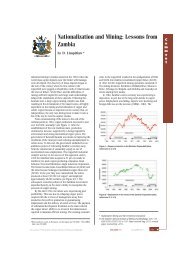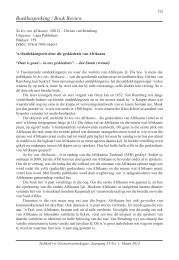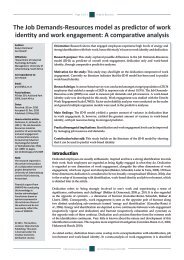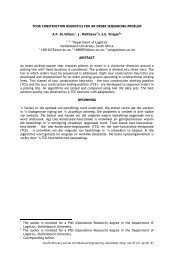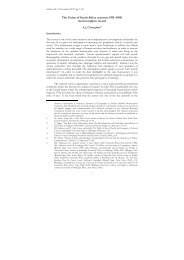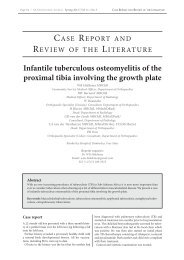91 Hendrik Verwoerd and the Leipzig School of Psychology in 1926 ...
91 Hendrik Verwoerd and the Leipzig School of Psychology in 1926 ...
91 Hendrik Verwoerd and the Leipzig School of Psychology in 1926 ...
You also want an ePaper? Increase the reach of your titles
YUMPU automatically turns print PDFs into web optimized ePapers that Google loves.
<strong>Hendrik</strong> <strong>Verwoerd</strong> <strong>and</strong> <strong>the</strong> <strong>Leipzig</strong> <strong>School</strong> <strong>of</strong> Pscyhology<br />
Forms <strong>of</strong> Religion among Children <strong>and</strong> Primitive Peoples”. The second<br />
course exp<strong>and</strong>ed on topics that had only been dealt with cursorily <strong>in</strong> <strong>the</strong> first<br />
one. Child psychology <strong>and</strong> ethnopsychology were clearly closely related<br />
fields <strong>of</strong> research for Volkelt so that it makes sense to take a closer look at<br />
<strong>the</strong>m: <strong>the</strong> <strong>Leipzig</strong> psychologists had developed <strong>the</strong>ir own pr<strong>of</strong>ile <strong>and</strong><br />
probably <strong>in</strong>fluenced <strong>the</strong>ir South African visitor through <strong>the</strong>ir teach<strong>in</strong>g. The<br />
fact that <strong>Verwoerd</strong> followed similar reason<strong>in</strong>g <strong>in</strong> his Stellenbosch lectures<br />
underp<strong>in</strong>s this view.<br />
Child psychology<br />
One <strong>of</strong> <strong>the</strong> maxims <strong>of</strong> child psychology is not to judge children with <strong>the</strong><br />
consciousness <strong>of</strong> an adult. This approach was first postulated <strong>in</strong> Germany<br />
by <strong>the</strong> Hamburg psychologist William Stern, under whom <strong>Verwoerd</strong> studied<br />
for one semester after leav<strong>in</strong>g <strong>Leipzig</strong>. In his groundbreak<strong>in</strong>g book<br />
Psychologie der frühen K<strong>in</strong>dheit (The <strong>Psychology</strong> <strong>of</strong> Early Childhood)<br />
published <strong>in</strong> 1<strong>91</strong>1, Stern identified various stages <strong>of</strong> development dur<strong>in</strong>g<br />
early childhood. He was adamant that children’s perceptions should not be<br />
judged as deficient because <strong>the</strong>y were different from those <strong>of</strong> mature<br />
adults. 63 Instead, he argued that perception <strong>and</strong> learn<strong>in</strong>g developed<br />
differently <strong>in</strong> children from how <strong>of</strong>ten imag<strong>in</strong>ed by adults, mak<strong>in</strong>g it<br />
imperative for psychology to pay attention to <strong>the</strong> cognitive processes that<br />
were typical <strong>of</strong> children. Volkelt’s own empirical research supported Stern’s<br />
hypo<strong>the</strong>sis, <strong>and</strong> he used it as a foundation for his research despite tak<strong>in</strong>g<br />
issue with some <strong>of</strong> <strong>the</strong> details. Fortunately, <strong>the</strong> notes from Volkelt’s <strong>1926</strong><br />
child psychology course have been preserved to provide some <strong>in</strong>sight <strong>in</strong>to<br />
<strong>the</strong> proceed<strong>in</strong>gs. These notes report on a project on children’s draw<strong>in</strong>gs<br />
presented by Lotte H<strong>of</strong>fmann, a research assistant. In <strong>the</strong> experiment <strong>the</strong><br />
children were asked to draw a three-dimensional cyl<strong>in</strong>der. Then <strong>the</strong>y were<br />
shown <strong>the</strong>ir own draw<strong>in</strong>gs toge<strong>the</strong>r with o<strong>the</strong>rs, <strong>in</strong>clud<strong>in</strong>g one drawn by an<br />
adult with <strong>the</strong> cyl<strong>in</strong>der <strong>in</strong> <strong>the</strong> correct perspective.<br />
Follow<strong>in</strong>g a widespread assumption among psychologists at <strong>the</strong> time,<br />
it was predicted that <strong>the</strong> children would concede that <strong>the</strong> adult draw<strong>in</strong>g was<br />
better than <strong>the</strong>ir own. This did not happen, however. Instead, <strong>the</strong> children<br />
<strong>in</strong>sisted that <strong>the</strong>ir draw<strong>in</strong>gs were <strong>the</strong> best. H<strong>of</strong>fmann concluded that <strong>the</strong><br />
children had not attempted to draw <strong>the</strong> cyl<strong>in</strong>der as close to reality as<br />
possible, unlike adults. It appeared that <strong>the</strong> children’s draw<strong>in</strong>gs were an<br />
expression <strong>of</strong> <strong>the</strong> child’s perception <strong>of</strong> his or her environment. H<strong>of</strong>fmann<br />
repudiated <strong>the</strong> normative expectations <strong>of</strong> adults around what was “correct”<br />
or “<strong>in</strong>correct” as <strong>in</strong>sufficient categories. The child’s way <strong>of</strong> perceiv<strong>in</strong>g <strong>the</strong><br />
world now became <strong>the</strong> focus <strong>of</strong> psychological research. 64 Although<br />
63. W. Stern, Psychologie der frühen K<strong>in</strong>dheit bis zum sechsten Lebensjahre (Quelle<br />
& Meyer, <strong>Leipzig</strong>, 1928), pp 31ff.<br />
64. AWZGP, Volkelt Papers, Box 33, Notebook 22, Fortschritte <strong>in</strong> der experimentellen<br />
Psychologie der K<strong>in</strong>der, Sommersemester <strong>1926</strong>. See also Volkelt’s research<br />
report which reflected on <strong>the</strong> research projects presented <strong>in</strong> this course as well as<br />
his own research at <strong>the</strong> time: Hans Volkelt, “Fortschritte der experimentellen<br />
K<strong>in</strong>derpsychologie”, Separate pr<strong>in</strong>tout from <strong>the</strong> Bericht über den IX. Kongress für<br />
experimentelle Psychologie <strong>in</strong> München (Gustav Fischer, Jena, <strong>1926</strong>).<br />
107



